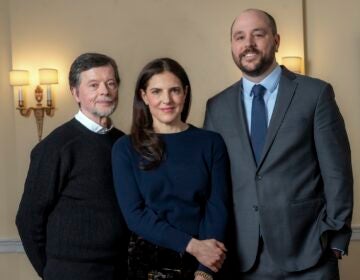Filmmaker returns to Camden roots to tell story of a ‘Higher Love’ threatened by addiction
“Higher Love” tells the story of Daryl Gannt as he struggles to extricate his girlfriend, who is pregnant and has a drug addiction, from the Camden streets.
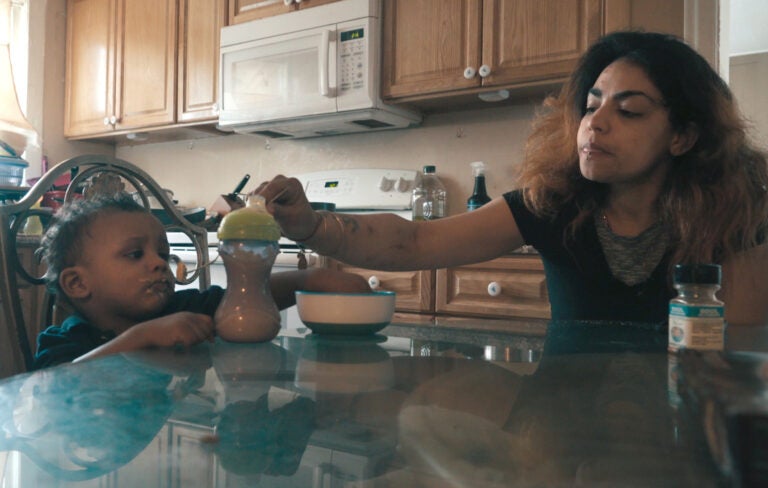
Nani feeds her son Darnez in the movie "Higher Love." (Courtesy of Hasan Oswald)
When Hasan Oswald looks back on his experience shooting the documentary “Higher Love” in Camden, the 31-year-old filmmaker is blunt about his naiveté.
“I had no idea what I was doing and I had no money,” he said simply.
The film, which won praise at several festivals, began streaming on multiple on-demand platforms Tuesday.
Even though Oswald grew up in the New York suburbs, he had relatives in South Jersey who gave him a place to live while working on the film. He’s also had a fascination with Camden dating from childhood.
Oswald’s ancestors were from Italy and settled in North Camden, where his dad and several uncles worked in a soup factory. The clan eventually moved to Cherry Hill.
Oswald always had “a morbid curiosity about the city. I heard, ‘Avoid Camden, lock your doors,’” he said. It reminded the filmmaker “of the Lion King, when Mustafa shows Simba and says, ‘We never go there!’”
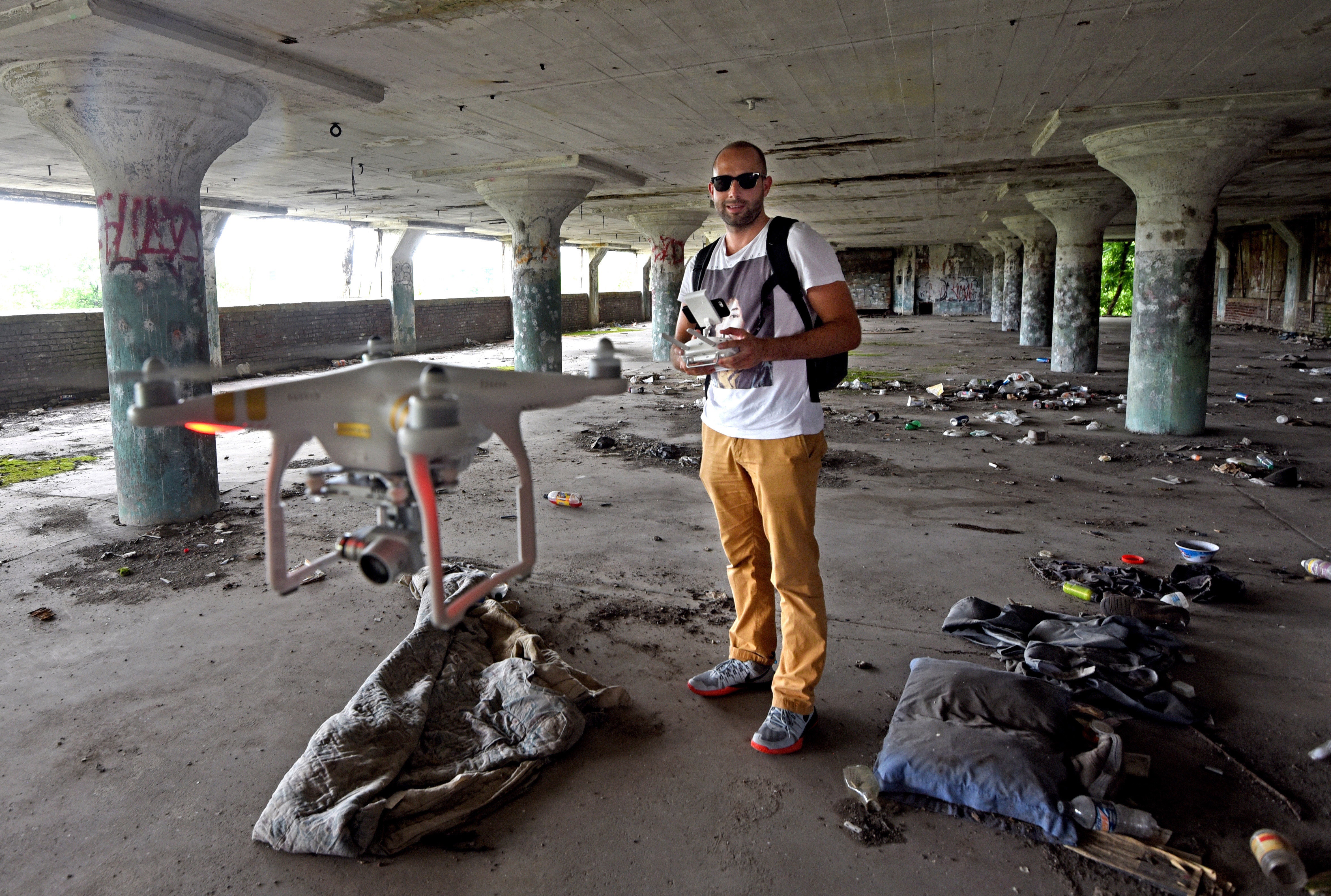
“Higher Love” tells the story of Daryl Gannt as he struggles to extricate his pregnant, drug-addicted girlfriend Nani from the Camden streets. This year, the 77-minute feature won the Grand Jury Prize at the Slamdance Film Festival and the Best New Director and Spirit Award at the Brooklyn Film Festival.
Oswald spent much of 2016 and 2017 filming in Camden. He donated blood every week for cash, used “a sneaky rental system” whereby he’d purchase lenses and cameras he needed and return them to the store within 30 days, and slept very little.
During his time in the city, Oswald was pulled in myriad directions, spreading himself “too thin” in retrospect.
“I wanted to cover the violence of Camden, the opioid epidemic, the crumbling factories,” he said. He initially filmed Camden politicians, but quickly eschewed those interviews to concentrate on residents. “I realized it couldn’t be talking heads or policy wonks” he said. “It had to be through the eyes of Camdenites.”
The Villanova grad ended up with eight vignettes, one of which became “Higher Love.” Some footage featured mothers who had lost their children to gun violence, including Taisha Mercado whose son Nate Plummer, 13, was murdered in 2016; and Meresa Carter, whose eight-year-old daughter Gabby Hill-Carter was killed by a stray bullet the same year. Oswald also interviewed inspiring figures in Camden, like Tawanda Jones, who founded the Camden Sophisticated Sisters drill team, and Vidal Rivera, a young boxer who became a Camden police officer to improve conditions in the city.
Originally, Oswald wanted to call the movie “Below the Brine,” an allusion to a Walt Whitman poem about “a world that exists below the surface of the ocean that no one pays attention to.”
Eventually, on the advice of unpaid collaborators Derek Rubin, Alexander Spiess, and Kait Plum, everything except for the tortured relationship between Daryl and Nani ended up on the cutting room floor, which still pains Oswald. “How do I explain to Meresa or Taisha that their heartbreaking stories wouldn’t fit into the editing thread?”
Camden activist Angel Cordero introduced Oswald to a group of people suffering from addiction that included Nani. “I met them at a motel and they immediately let me right into their world, which was pretty shocking,” said Oswald, whose film includes multiple scenes of his subjects doing drugs.
The next morning, he got “a furious phone call” from Daryl Gannt. “He didn’t want me filming,” said Oswald. “I almost packed up and left.”
The two met for coffee. “He told me,” said Oswald, “that he’d been trying to save her for 10 years and now she’s pregnant with his kid.”
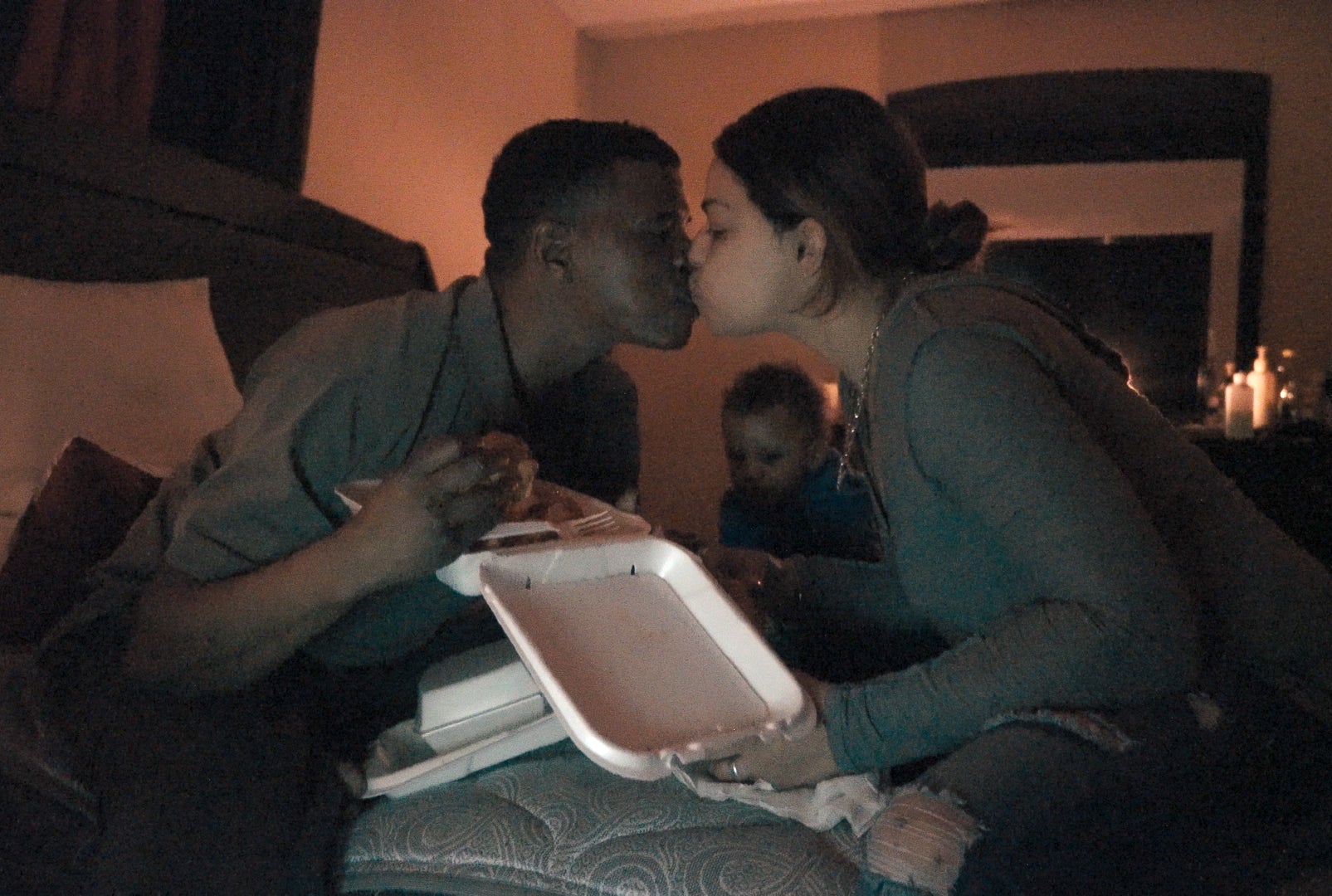
Gannt recalled wanting “to know his intentions. I told him this was gut-wrenching for me.” The printing press operator had gotten involved with Nani 10 years ago; he was 35 and going through a difficult divorce; she was 22, sober at the time, and “a breath of fresh air.” Three or four years into the relationship, she became addicted — first to prescription drugs and eventually cocaine and heroin — and Gannt believed that if the couple had a child together, “the maternal instinct would kick in” and Nani would get clean.
Instead, the pregnancy became what Gannt called a “cat-and-mouse” game, in which he would search the Camden area when Nani — then on methadone — repeatedly disappeared. He was often accompanied by Oswald. In one of the most powerful scenes in the film, he vents about the mother of his child, calling her names while struggling to hold back tears.
“He had always kept his composure,” said Oswald, “and for the first time, that wall shattered and he showed his vulnerability and the true depth of his pain.”
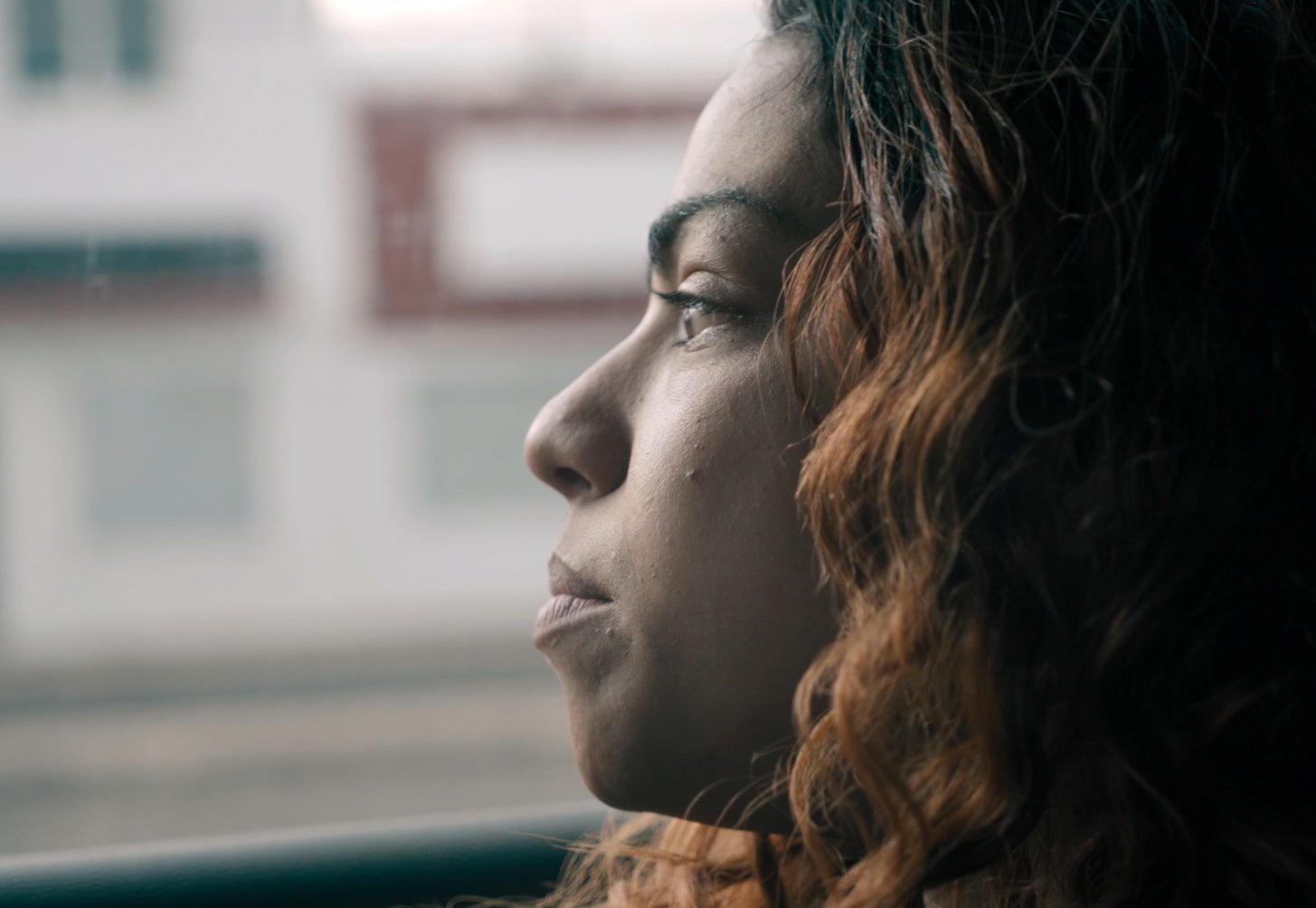
Another of Oswald’s favorite scenes is one that shows Nani trying to take care of Darnez, her child with Gannt, months after giving birth. She is distracted and makes her son cry by taking the larger part of an ice cream sandwich for herself and walking away, leaving the rest in his sticky fingers.
“That scene impacted me,” Oswald said, “because I’d be home alone with Nani and Darnez and I was constantly pulling cigarettes out of his mouth and keeping him from climbing the stairs … It shows her trying to be a mother, but it’s a total loss.”
At one point in the documentary, Brenda Antinore, director of Camden’s Seeds of Hope Ministry, is asked by Gannt to help guide Nani into recovery.
Antinore, who has waged her own battle with drug addiction, founded her ministry 15 years ago with her husband. She found the film “raw” and “extremely real.”
“I have so much respect for Daryl in that he did the best he could to keep his family together,” said Antinore. “He’s chosen to believe the best in that situation because of his love and knowing that at any moment it could change.”
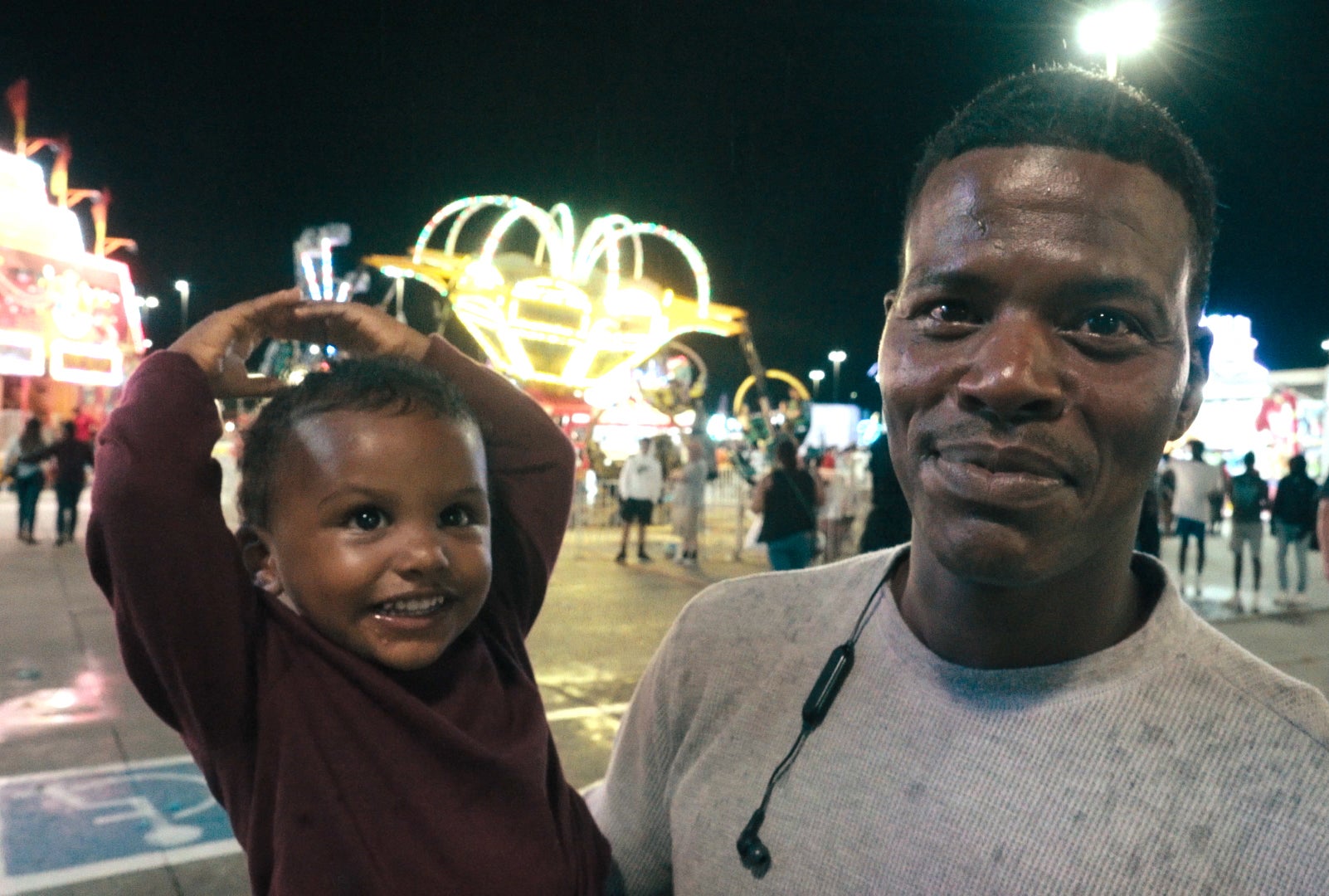
When he can’t help Nani quit drugs, Gannt leaves Camden to raise Darnez in another state. “He’s given up that Darnez can change her heart,” said Oswald. “Because he’s addicted to Nani, obviously, and he finally broke free.”
Antinore viewed that as a positive step. “On a certain level,” she said, “for him to be well, he has to let that relationship totally go.”
For Gannt, Oswald was a much-needed “sounding board.” He has seen the movie five or six times, and his only criticism is that it “shows a lot of pain and rage,” but left out more “happy, euphoric” moments that Oswald filmed of Gannt, now 50, bonding with his adult children.
Oswald, who said he and Gannt remain close, is currently working on a film set in Iraq about ISIS enslaving and killing members of the ethnic minority Yazidis.
The pandemic has been especially frustrating for Oswald, with “Higher Love” winning awards at virtual film festivals, “but we can’t be there and celebrate with our team and with characters in the film like Daryl.” Oswald was afraid the movie might be “triggering” for people battling addiction, and said he’s been heartened by positive responses to the film.
“We had some recovering addicts at our premiere and they were in tears and said they absolutely loved it,” he said.
Still, Oswald has fielded criticism for coming into Camden as an outsider, and making a movie about one of the darker elements of the city.
“Especially as a white filmmaker, I hear, ‘Why do you feel that you should be the one to tell this story?’” Oswald said. His answer is that “this city has been ignored for so long that this was a chance for people here to regain some agency, some voice.” Oswald believes the movie provides a window on an opioid epidemic that is “a symptom of systemic neglect” in Camden.
He is planning a showing of “Higher Love” in Camden post-COVID, and when budget permits, hopes to create “episodes” with the rest of the material he shot in the city.
A few months ago, Daryl Gannt moved back to South Jersey to spend more time with seven older children who are still in this area. He describes Darnez, now four, as “so loving and smart.”
Gannt has reached out to Nani more than once. He says she is still addicted and living in Camden.
If he can encourage her to get into treatment, said Gannt, “she’ll still have a chance. I would take her back.”
“It’s higher love, honey,” he told the reporter. “That’s how I am.”
April Saul is a freelance photojournalist based in Camden. She was interviewed about violence in Camden for Oswald’s film; after all her scenes were cut, she received a screen credit as a field producer as a gesture of thanks.

Get daily updates from WHYY News!
WHYY is your source for fact-based, in-depth journalism and information. As a nonprofit organization, we rely on financial support from readers like you. Please give today.





